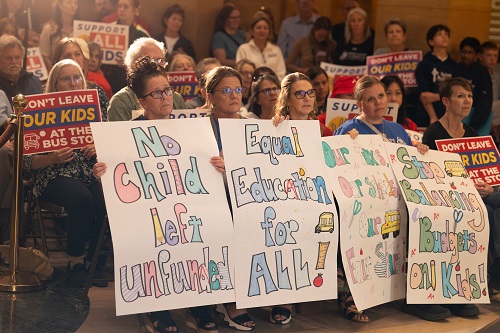
The Minnesota Catholic Conference (MCC) is celebrating five key victories at the conclusion of the Minnesota State Legislature’s special session to finalize Gov. Tim Walz’s two-year budget.
“Once again, Minnesota Catholic Conference was at the center of Minnesota’s most consequential legislative debates, securing key victories in a contentious session marked by a cloudy budget forecast and fierce competition for funding,” Jason Adkins, MCC executive director and general counsel, wrote in a news release June 10. “Thanks to the constant prayers and advocacy of Minnesota Catholics, the bishops and MCC staff were able to advance the common good and protect the most vulnerable among us.”

Nonpublic school pupil aid was protected from proposed cuts, with approximately $55 million a year allotted for essential services — including busing, textbooks, counseling and nursing, MCC wrote. A protest of the proposed cuts that included Catholic school leaders and concerned parents was held May 7 in the Capitol rotunda. The rally was organized by Minndependent, a nonprofit that works to connect and strengthen Minnesota’s independent schools, and the MCC.
Legalizing online sports gambling, which MCC opposes, was once again introduced. But multiple bills in the Senate failed to pass any committee, and there were no hearings in the House.
Cuts to the state’s child tax credit were not given serious consideration, MCC wrote, saying the bilateral policy is seen as a success on both sides of the aisle.
A major point of contention on June 9 was health care access for undocumented adult and child immigrants. While access for adults, which began five months ago, was dropped as potentially increasingly expensive, children retained access to MinnesotaCare. The MCC said the move ensures that all children can receive basic health insurance.
In another victory, an in vitro fertilization (IVF) proposal was not included in the two-year budget that would have required insurance coverage for IVF, both raising insurance premiums and threatening religious liberty, MCC wrote.
“MCC policy positions are not inherently religious positions, but sound principles rooted in reality that are in accord with right reason and accessible to all,” Adkins wrote. “Our advocacy model is to propose these policies and foster common ground for the common good. We are glad when we can persuade members of all backgrounds as to the justice or injustice of particular legislation. Where we fall short, such as protecting access to health insurance for our undocumented adults, we will continue to be faithful in our duty of advocacy.”




